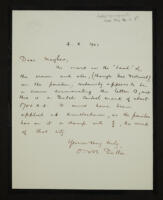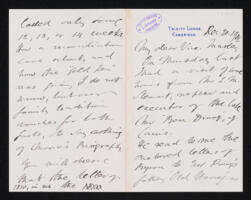Accompanying a medal in commemoration of Queen Victoria's Jubilee.
Concerning Porson's seal.
Concerning the request of V. E. Mourek to get access to MS O.7.38.
Asks permission for a scholar from Vienna University to consult books in the Library for part of his work on the Corpus scriptorum ecclesiasticorum.
Green leather volume, with embossing and gold decoration. Printed illustration from 'Happy New Year' card pasted to inside front cover. Bookplate, 'Ex Libris Bryan William James Hall', with coat of arms and illustration, pasted to front free endpaper.
Numerous autographs, mostly in the form of ends of letters and addresses on envelopes, pasted into book. Notes beneath items (sometimes also pasted in) often identify writers. Complete letters etc have been described in individual records dependent to this one, referenced by their folio numbers; signatures and addressees are referenced by linked authority record only. Some names remain undeciphered or unidentified.
Compiled by a sister of C. W. King, see part letter from King on f. 14r, 'I enclose the autograph of a distinguished Grecian for your book. With love I am, my dear Sister, yours affect[ionate]ly C. W. King'. Although no first name appears, C. W. King's only sister appears to have been Anne, sometimes known as Annette (1824-1874). A letter from W. G. Clark to C. W. King, preserved on the verso of the flyleaf, was sent with 'some autographs for your friend', and there are also envelopes and letters addressed to William Aldis Wright and other members of Trinity suggesting King was actively gathering material for his sister. The bulk of the collection appears to have been assembled between the late 1860s and early 1870s.
Sans titreConcerning John Lyly's Euphues.
Concerning verse translations of Tennyson.
Sends a packet of MSS found in the Registrary, concerning John Colbatch's suit with Richard Bentley, possibly part of C. J. Monk's gift to the College.
Concerning the acquisition of a copy of the Hebrew Samaritan Pentateuch from a fund left by the former Librarian, Robert Sinker.
Sending a copy of a Cambridge ale jug, the original of which was given to William Whewell.
Requests the New Testament of Wycliffe's Bible.
Re will of Sylvius Elwes.
Asks for his volume The ministry of fine art to the happiness of life so that he may make corrections and add an index.
Requesting certain volumes of the Monthly Notices of the [Royal Astronomical] Society.
Presenting a book on Central Asia written in Germany.
Letter from O. M. Dalton to [Henry] Mayhew [both of the British Museum]; letter from Mayhew to Canon Musgrave (with envelope); three letters from Canon Musgrave to the Master of Trinity [Henry Montagu Butler]; letter from Butler to the Librarian [Robert Sinker].
Trinity Lodge, Cambridge.—Encloses six letters (2–7) written by Lord Byron to Henry Drury, which have been bequeathed to the college by the son of the recipient.
—————
Transcript
Trinity Lodge, Cambridge
Dec. 20. 1902
My dear Vice-Master,
On Thursday last {1} I had a visit of some hours from Mr L. M. Stewart, nephew and executor of the late Mr “Ben Drury,” of Caius {2}.
He read to me the enclosed letters of Byron to Mr Drury’s father, “Old Harry” as he was called at Harrow, a Son of Dr Joseph Drury the Head Master.
He left out one sentence in one letter about the Turks, which he told me was disgusting {3}, and I have not seen it.
The letters date between 1807 {4}, when the Hours of Idleness were published, and 1815 soon after Byron’s Marriage.
As there are numerous references to my Father, it may be well just to point out that my Father succeeded Dr Drury at Easter, 1805, and that Byron left the School that summer, i.e. I suppose, at the end of July. Consequently, their relation as Master and Pupil lasted only some 12, 13, or 14 weeks. How a reconciliation came about, and how the “gold pen” was given, I do not know, but our family tradition vouches for both facts, to say nothing of Moore’s Biography.
You will observe that the letter of 1810, in wh. the {5} reference to the “gold pen” occurs, describes the famous swim from Sestos to Abydos, and adds—what I had either not known or forgotten—that the swimmer had made a previous attempt which failed.
May I ask you and Dr Sinker kindly to take Charge of the letters, which Mr Benjamin Drury bequeathed to our Library, and to consider where and in what form they may best be kept. The fact that they are a bequest should be specially recorded.
Perhaps it might also be recorded that Dr Joseph Drury, the Grandfather of the Testator, was himself a Trinity man. His Son, “Old Harry,” to whom Byron wrote the letters, was at Eton and King’s.
I am, my dear Vice-Master,
Most truly yours
H. Montagu Butler
—————
2 folded sheets.
{1} The 18th.
{2} Benjamin Drury’s sister Emily (1813–1902) married Stewart’s father, Lestock Wilson Stewart (1824–1876), an army doctor, in India in 1852.
{3} See the letter of 3 May 1810 (R.2.40A/4). Stewart may well have omitted more than one sentence.
{4} The earliest of the letters (R.2.40A/2) in fact dates from 13 January 1808, but it was misdated 1807.
{5} ‘1810’ struck through.
The research notes consist of Boughey's notes, letters, and publications from others relating to various aspects of the College's history, as well as the publication of the history. The papers appear disordered from their original state but because there are some runs of like material they have been left as found. Boughey’s note passing them on to R. V. Laurence may be found as item 399, with a covering note and instruction at items 410-411.
The letters are from W. Emery Barnes (items 220-221), W. H. D. Bird (item 415), F. C. Burkitt (item 330), J. W. Clark (items 400-401), C. M. Neale (item 308), John Peile (items 325, 327), Alexander Pulling (item 427), and Alfred E. Stamp (item 372). Letters from Robert Bowes (item 386), J. W. Clark (items 63, 250, 390), F. E. Robinson (items 231, 233, 235, 242-244, 247, 252-253, 383-385, 387, 394) and Hutchinson & Co. (items 224-226, 230, 248-249, 251) concern the publication of the history. These are accompanied by a draft of Boughey’s letter to Hutchinson & Co. (item 245) and Boughey’s original memorandum of agreement with F. E. Robinson dated 4 Nov. 1897 (item 246).
Printed material consists of a card advertising Rouse Ball's History of the First Trinity Boat Club (item 207), five of J. W. Capstick’s halftone photographs of the 1st Eastern General Hospital in Nevile's Court and on the Backs (item 209), G. F. Cobb’s A Brief History of the Organ in the Chapel of Trinity College, Cambridge (item 356), three printed catalogues from F. E. Robinson & Co. dated 1898-1901 and notices by F. E. Robinson from the same period (items 227-230, 232,237, 240-241), The Roof-Climber’s Guide to Trinity (item 366), the first paper of the Society for the Prevention of Cruelty to Undergraduates, February 1838 (item 170), an offprint of Robert Sinker’s The Statue of Byron in the Library of Trinity College, Cambridge (item 414), and Vincent Henry Stanton’s Some Makers of Trinity College. A Sermon Preached in the Chapel of Trinity College Cambridge, on December 9, 1898 (item 442).
Notes were written on verso of letters, including one from Herbert P. S. Devitt asking for leave (item 19), a letter from W. H. D. Rouse to Mr Stewart dated 3 Oct. 1902 (item 39), a book recommendation ticket for the library (item 38), and a Trinity gate bill sent to the Senior Dean for Monday night Aug. 25, n.y. (item 41). Two unusual items are clipped pieces of an early manuscript (item 406).

